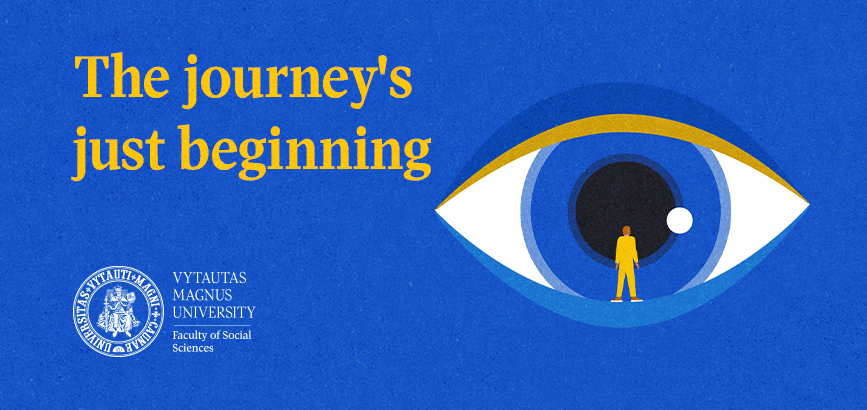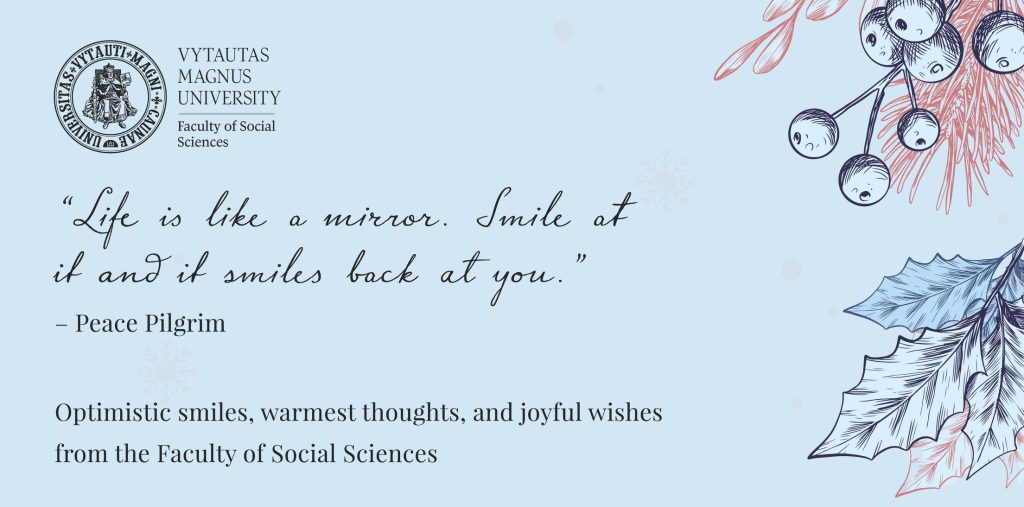Competition for the best Master’s thesis that includes ESS data analysis
A group of researchers from Vytautas Magnus University that is responsible for the implementation of European Social Survey (ESS) in Lithuania is announcing a competition for the best Master’s thesis that includes ESS data analysis.
Registration: https://forms.gle/F1rMPwNukmtQyKUa8
Christmas greeting
Women at the top: transformation of Lithuania’s political culture or excuse to do nothing?

Kazimira Prunskienė, Ingrida Šimonytė, Irena Degutienė. They all served – or will serve – as Lithuania’s prime minister / BNS, LRT
Women stand at the helm of all the three parties that are looking to form the government after Lithuania’s recent parliamentary election. But women in top positions could also serve as an alibi to ignore overall gender inequalities, observers say.
The new parliament, Seimas, will have 103 male and 38 female members. Although an increase of 5 points, women will still make up only 27 percent of MPs.
„The election of parties with women leaders could mark a change in political culture“, believes Natalija Mažeikienė, a professor at Vytautas Magnus University.
Read more: Lithuania’s PM candidate: destroying ‘world order’ and why women-led parties won
Renewed 2020 Autumn Semester Timetable
 RENEWED 2020 AUTUMN SEMESTER TIMETABLE PROGRAMMES AND COURSES
RENEWED 2020 AUTUMN SEMESTER TIMETABLE PROGRAMMES AND COURSES
IN ACCORDANE WITH https://www.vdu.lt/en/important-information-to-students-about-start-of-ay-2020-2021/
Regarding upcoming Academic Year 2020/2021
on behalf of Vytautas Magnus University (VMU), we would like to express our appreciation for your decision to join our university community. We would like to share our current plans for the upcoming autumn semester 2020.
The academic year at VMU will start as usual on 31 August. We prefer face-to-face activities to the online mode. If needed, some of the activities at the beginning might take place online. Still, we are ready and fully equipped to deal with all possible scenarios: resumed spread of the virus, national and international restrictions, and other circumstances that may force us to move online during the autumn semester.
We allow international students who experience difficulties entering Lithuania to attend studies using online tools and, if necessary, on an individual basis, until the end of October or until most of them have arrived in Lithuania.
Please note that Lithuania is among the safest countries in the World in terms of COVID-19. We advise you to continuously check information regarding visa issuance policy (information provided by the visa center and the Lithuanian Embassy at your country of residence). VMU is eagerly waiting for you to arrive and join our community in the autumn semester 2020.
In case of any matters that require immediate attention, you are welcome to contact the VMU International Study Unit (for degree students, studies@vdu.lt), the Erasmus Mobility Unit (for Erasmus+ exchange students, erasmus@vdu.lt) and the International Cooperation Department (for other inquiries, international@vdu.lt).
Algis Krupavičius the public continues to rally around the government. But for how long?
Public opinion is inertia based. This truth is known to every starting sociologist or political scientist. As such, in the current context, from the perspective of public opinion, there are at least two pieces of news for the government. The good – the popularity of ruling (the prime minister’s) parties in most European countries, compared to pre-pandemic ratings, has grown. Not to the same extent everywhere, but in most countries. Even now, it continues to increase a little. But not by much. Overall, across 21 European countries, it has risen by 4%, when comparing surveys between February and May.
Daugiau skaitykite...
Easter greetings
 Let Easter Resurrection gives us hope and bright expectations!
Let Easter Resurrection gives us hope and bright expectations!
Easter holiday
 April 9-15 – Easter holiday at VMU – take a safe rest following quarantine requirements!
April 9-15 – Easter holiday at VMU – take a safe rest following quarantine requirements!
Algis Krupavičius. Delegitimization or is the European Union withdrawing?
Pandemic surrounds us. More than 2 billion people around the world are now in self-isolation. The world closes up, though China is gradually opening up. But Europe has closed off. Perhaps except Sweden.
The coronavirus drama is rapidly developing in namely Europe. So far, based on its statistics, Europe is far ahead of both the USA and China. After two world wars, Europe was the place in the world, where more than 60 years, the largest transnational integration project ever was being implemented. Over time, it had several names, but currently, it is the European Union. The optimists of this project have for a time even seen the mirage of a United States of Europe on the horizon.
However, instead of it, a molecule appeared – the coronavirus. A molecule, which might even be too small to see with a common microscope. But it has made Europe into a place, where “the rescue of the drowning is left to the drowning.” And so Italy, Spain, Lithuania, Poland, Germany and so on have closed up. Even though Europe has for a time now wanted to be an example of open societies for the whole world.
Things are different now. In a public opinion survey from early last week in Spain, Italy and France, we can see that a large majority of these countries’ citizens favour the strict self-isolation measures imposed by their governments. In Spain, they have the support of 87% of respondents, Italy – an entire 90% and France – 88%.[1] In Lithuania, some time ago, 66% of respondents viewed the government’s actions positively. There is almost no doubt that in essence, we would see a very similar public opinion picture across European countries. Its name is “the return to nation-states.”
Is the European Union helping overcome the crisis? This is a question that was also asked of the Italians, Spaniards and French. Most (61%) of Italians answered that the EU is not helping and only 24% thought that it is.
In France and Spain, opinions on this matter varied more. 46% of the French evaluated the EU negatively and 31% positively, but the distribution of opinions was in the negative for the European Union. In Spain, it was not a majority, but still, only 43% that thought the EU is helping to overcome the crisis, while 34% – that it isn’t. But there were significant expectations for EU help. In a 2016 Eurobarometer survey, an entire 89% of respondents said that they would expect help from the EU if a natural disaster struck their country. That the EU’s cumbersomeness during a pandemic is and will be viewed critically by most EU country societies (perhaps except such hyper-Euro-optimists like Lithuania) probably is not in doubt.
So where is the European Union today? Some EU policy observers say that the European Union has withdrawn. Others think that it might not have withdrawn yet, but its actions regarding the pandemic are too little, too late. And it is hard to disagree.
A few examples. Brussels. March 9. Monday. Commission president Ursula von der Leyen’s press conference to mark the European Commission’s first 100 days. There is a single paragraph in the president’s speech regarding the pandemic. In it is the message that the EU is monitoring events in Italy, there could be a notable impact by the virus on societies and economies and actions must be coordinated. There’s also the notion that the Commission’s coronavirus response team (an entire five European commissioners in it: Lenarčič, Kyriakides, Johansson, Vălean and von der Leyen herself) alongside the member states are beginning to discuss preparations for the potential crisis, risk evaluations, measure coordination, diagnostics, treatment and vaccine research financing, joint public procurement, for example for protective equipment. Bureaucratically it’s all seemingly correct. But outside the windows of the EC’s offices, there are already 144 thousand infections. The centre of gravity for these is rapidly shifting from China to Europe.
To be fair, it is necessary to note that in regard to the speed and scope of EU institutional response to the pandemic, another question should be posed – what is it that the EU can do here? And from there, a whole slew of answers arrives. Healthcare policy is the remit of member states. This crisis has no precedent. It is global. Finally, what can EU officials do in response to the crisis? Tim King, an analyst at POLITICO, wrote: “What EU officials like Michel and European Commission President Ursula von der Leyen can do to respond to the coronavirus is only a pale imitation of what national leaders can do.”[2]
The EU passed a 37 billion euro plan, which is being compared to the Marshall Plan. For countries with economies of the size of Lithuania’s, an extra 1.5 billion euro injection, when we ourselves intend to allocate 2.5 and later on 5 billion euro, is significant. And it is indisputable. Especially when the European Central Bank, European Stability Mechanism have far greater financial tools. Thus, the EU has capacities here.
Nevertheless, the direct EU billions look a little different int eh context of larger states. In order to safeguard its economy, Germany approved a 750 billion euro bailout package, France declared a 45 billion euro injection into its economy and a guarantee for bank loans up to 300 billion euro, Spain formed a 200 billion euro bailout package.
Even the most pandemic struck Italy has planned a more than 350 billion euro aid programme for its economy. Neighbouring Poland approved a 47 billion euro national budget package to resolve coronavirus issues. Jointly, based on very preliminary calculations, approximately a 2 trillion euro burden of overcoming the crisis will land on member states.
By the way, Polish Prime Minister Mateusz Morawiecki even clashed with the EC, stating that, “So the flexibility that the EU is proposing is certainly a good step, but so far the EU hasn’t taken any new measures. It’s evident that in this particular case, the EU doesn’t act as fast as the nation-states, doesn’t act as fast as Poland.”[3] Without going into details, Morawiecki is completely correct here.
And these verbal exchanges continue. On March 26, von der Leyen explained at the European Parliament plenary session that, “When Europe really needed to be there for each other, too many [countries] initially looked out for themselves. When Europe really needed an all-for-one-spirit, too many initially gave an only-for-me response. When Europe really needed to prove that this is not only a fair weather union, too many [countries] refused to share their umbrella.”[4]
It seems that the EU is experiencing a crisis of delegitimization or the loss of legitimacy. It has been difficult to come to terms in even the small EU member state leaders’ circle. Even if the EU was fairly effective in resolving the 2008-2010 crisis, was active in the face of the 2015 migrant crisis and so on.
Why is the EU so passive today? We can probably find a number of reasons, but one of the most important is the lack of political leaders at top EU institutions. Without a doubt, the excuse can be made that the European Commission has been recently formed, European Council president Charles Michel is also new and the entire European Parliament has just begun its term, thus it is hard to expect political leadership from them. Nevertheless, it’s worth disagreeing with such an attitude. It seems that Brussels politics are faced with continuing problems of political leadership.
A few facts. The European Parliament elections are, it is no secret, viewed as second rate. This status is firstly displayed by low voter turnouts in them. The appointments of senior EU institution heads have long been ill with the disease of “democratic deficit.”
Five years ago, some competition emerged through the spitzenkandidat procedure to become head of the EC, but in 2019, due to political dealings in some large EU countries, this was ended. It’s also no holds barred regarding appointments to the European Commission, where the convenient, but not necessarily competent are wanted. Finally, we have a result when the EU’s top institutions hold not second, but third or fourth echelon politicians. They are typically not leaders, their credo is bureaucratic politics. Or politics with pre-written rules. However, in times of crisis, rules often fail to work or must at least be adapted to circumstances. One Lithuanian crisis manager also repeated for weeks on end that all is well, that we are working based on an algorithm, ergo pre-written rules. Of course, as usual, we can find exceptions everywhere, including among EU politicians, but exceptions only confirm the rule. And if the EU can just somehow find leaders, then perhaps the Union won’t withdraw.
Algis Krupavičius is a professor at Vytautas Magnus University.
[1] https://www.politico.eu/article/coronavirus-lockdown-spain-italy-france-public-backing/
[3] https://www.politico.eu/article/polish-pm-slams-eu-funding-response-to-coronavirus/
[4] https://www.politico.eu/article/von-der-leyen-slams-only-for-me-covid-19-response/
On the threat of COVID-19 virus (coronavirus) spreading in Europe and Lithuania
 On the threat of COVID-19 virus (coronavirus) spreading in Europe and Lithuania, as well as the decision of the World Health Organization to declare a pandemic, the building of VMU Faculty of Social Sciences, Jonavos str. 66 on Friday, March 13th will have a sanitary cleaning. No classes will be held there.
On the threat of COVID-19 virus (coronavirus) spreading in Europe and Lithuania, as well as the decision of the World Health Organization to declare a pandemic, the building of VMU Faculty of Social Sciences, Jonavos str. 66 on Friday, March 13th will have a sanitary cleaning. No classes will be held there.
In next few days the university will inform about further decisions related to the COVID-19 virus.
















